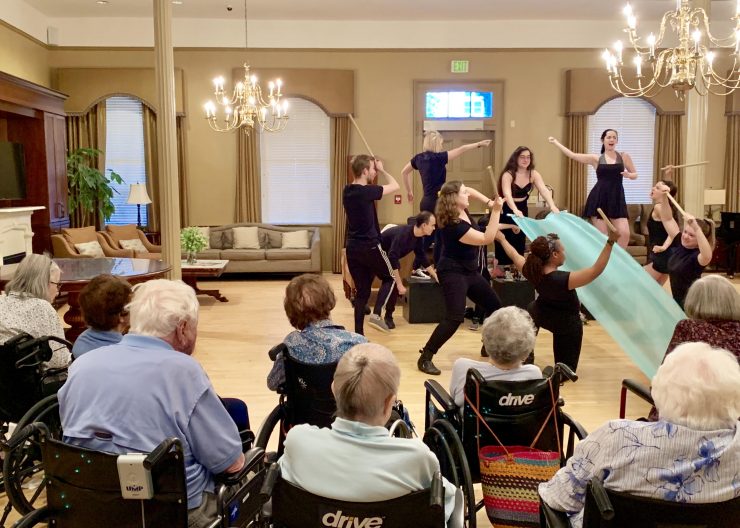
Your Aging Parents: Finding the Right Nursing Home
While NolaBoomers.com is under construction, our articles can be found here on our sister site, Nola Family.
It’s an agonizing process to watch as your parents’ health, both mental and physical, deteriorate till it’s painfully obvious that they can’t live independently anymore.
Your mother shows signs of dementia and your father’s hip pain seems unbearable. She consistently forgets to take her own medications. Last week, he fell, twice — once leaving the doctors office and another while in the shower. He was home alone.
No matter how excruciating it is to watch, this is the natural course of living. Everyone, if lucky enough to reach old age, will need to prepare for the time when we’ll need to rely on others.
Now, you’ve started researching some options for your parents. In-home care can be expensive; your parents aren’t quite ready for hospice, but they need more care than an assisted living facility can provide.
Assisted living facilities provide everyday care by helping residents eat, walk, and bathe. It’s usually temporary. A nursing home seems to better fit their needs.
What is a nursing home?
After more research, you discover that there’s a whole range of nursing home types and options. “There is no standard definition of a nursing home,” says Erin Kolb, chief operating officer for Poydras Home, a nursing home in the Garden District.
One facility might cater to memory care patients — those with dementia — while another may cater to those that need physical care like rehabilitation after surgery or a chronic ailment. And there are some that provide services for both, but not usually in the same building.
[button color=”green” size=”big” alignment=”center” rel=”follow” openin=”newwindow” url=”https://nolafamily.us12.list-manage.com/subscribe?u=32739484a8d9eb85dc60bffc1&id=4ed0280e4c”]Sign up for our newsletter today![/button]
However, there are some features that represent all nursing homes when compared to other elderly care centers. Nursing homes provide long-term 24/7 medical and living care by preparing meals and monitoring dietary restrictions; tracking medications and health issues; and staffing nurses, nursing aides, at least one on-call physician, and should be licensed and certified.
The rest — social activities, visiting hours, payment, number of residents that can be accommodated, specific types of care, and more — is different for each facility. You and your parents will need to do some homework to find the right facility, which sometimes means separating your parents.
“This is probably the most surprising thing people learn when they tour nursing homes,” Kolb says.
Mom and dad, if they both need care, will probably not be housed together. No one ages the same way and no nursing home will be equipped enough to accommodate two people with very different age-related issues in the same room. They may be living on the same campus, but in different buildings, or depending on what’s available, one may be housed across town.
Finding the right nursing home
No matter the type of care your parents need, there are a few things that potential residents and their family members should know, like needing a doctor’s order before moving in to a nursing home. But it’s never too early to begin the process.
For instance, Kolb recommends touring about three to four nursing homes to get a better handle on what your parents need and want — get on a few waiting lists, which can be done before receiving a doctor’s order. There’s no penalty if a space opens up and your parents aren’t ready yet.

Also, determine payment options. Some nursing homes accept insurance, some accept medicaid and medicare, some are partnered with the Department of Veteran Affairs, and some are only private pay.
After establishing the type of care your parents need and payment options have narrowed the search, it’s time to get to business. Schedule a tour with some facilities armed with a checklist and a few questions.
New Orleans resident Ellen Kempner knows a thing or two about finding the right one. The search for a nursing home that fit her mother’s condition and needs was hard, but ultimately it was the right decision, she says.
“My mother’s time spent at the nursing home made her life better,” Kempner says. “Even though she had limitations, she was happy, healthy, and content.”
Together, Kempner and Louisiana Ombudsman Tanya Hayes, an appointed public advocate, have a few items for nursing home-shoppers to check off.
Location. It is important to be as close to family as possible for visitation or emergencies. If you can’t find a home nearby, choose another trusted family member who is closer. Hayes suggests to “find a place with great quality first and then focus on the closeness of the nursing home.”
Tour. Always make sure to schedule a visit to any nursing homes you are looking into before making a final choice. Don’t stop visiting once you choose a nursing home. Kempner suggests that you visit nursing homes unannounced during meals because then “you learn a lot about the treatment of the residents, the staff, and the quality of care.”
Staff. Does the staff have access to continuing education and training programs? Does the administrator look like they care for their staff? How does the staff interact with the residents? Does the staff know residents by name? Make sure the nursing home does not hire people with records of mistreatment or neglect by checking the nurse aide registry. Make sure the nurses are willing to work with you to ensure all needs are met. Kempner feels there should be a “partnership between you and the staff.”
Services. Look into the services that the facility provides the residents. Hayes believes that the dining experience at a facility is very important. She suggests that you take note of the quality of the meals. Does the dining area look clean? Are plastic or disposable plates being used? Are they given food choices? The kind of activities provided to residents is important as well. What activities are provided and is there variety around the clock? Are there any activities outside of the nursing home like field trips to buffets and museums? Are the activities tailored to the residents? Are there computers with internet access?
Independence. Moving to a new place can be daunting. Making sure that your loved one has freedom while there is essential. Look for a facility that allows the residents to make their own choices like meal options, activities participation, bedtime and wake-up times, and bathtime. Hayes says to notice the nursing home’s environment; is it a “I tell you what to do vs. what would you like to do” environment?
Rating System. Hayes suggest that you visit the Centers for Medicare & Medicaid Services website (cms.gov), which has a five-star rating system for any nursing homes that accept federal money. Hayes stresses that you should not look at any nursing homes with less than 4 stars. Kolb adds that these nursing homes are also subjected to an annual survey by the government and are required to publicly display the rating and results of the survey. Always request the results of the survey of any medicaid/medicare nursing home you visit.
Current Residents. When you visit, how do the residents look? Do they smell like urine? Does the home smell? Do the residents’ clothes look clean? Is their hair brushed? Are their nails clipped?
Kempner says, “you’re not only looking out for your parent’s best interest, but you also must be an advocate for other residents who don’t have loved ones to check in on them.”
How to know when it’s time to start looking, here are 8 tips:
It’s never too soon, but it could be too late. Erin Kolb with Poydras Home has this advice for when to know it’s time to start looking for other living and care arrangements for your aging parents.
Memory loss. Forgetting appointment times even after being reminded a few times.
Mismanagement of finances. Bills are not paid on time more and more often.
Differences in appearance. Clothes are mismatched or ill-fitting.
Old food left in the fridge. Food sits well past their expiration dates.
Mismanagement of medications. Meds are taken at the wrong times or not taken at all.
Multiple falls. Falls happen more often with more severe outcomes.
Damage to their car. Driving becomes a danger to your parents and other people.
Change in hygiene. Hair is not combed, nails are too long, or they haven’t bathed recently.

Chapelle Johnson is an Edit Intern at Nola Boomers Magazine.

